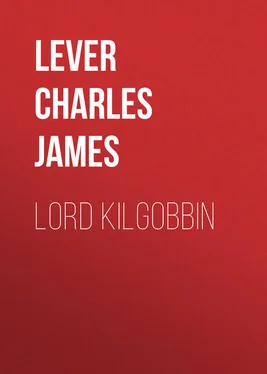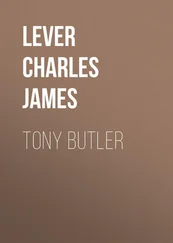Charles Lever - Lord Kilgobbin
Здесь есть возможность читать онлайн «Charles Lever - Lord Kilgobbin» — ознакомительный отрывок электронной книги совершенно бесплатно, а после прочтения отрывка купить полную версию. В некоторых случаях можно слушать аудио, скачать через торрент в формате fb2 и присутствует краткое содержание. Жанр: literature_19, foreign_antique, foreign_prose, на английском языке. Описание произведения, (предисловие) а так же отзывы посетителей доступны на портале библиотеки ЛибКат.
- Название:Lord Kilgobbin
- Автор:
- Жанр:
- Год:неизвестен
- ISBN:нет данных
- Рейтинг книги:3 / 5. Голосов: 1
-
Избранное:Добавить в избранное
- Отзывы:
-
Ваша оценка:
- 60
- 1
- 2
- 3
- 4
- 5
Lord Kilgobbin: краткое содержание, описание и аннотация
Предлагаем к чтению аннотацию, описание, краткое содержание или предисловие (зависит от того, что написал сам автор книги «Lord Kilgobbin»). Если вы не нашли необходимую информацию о книге — напишите в комментариях, мы постараемся отыскать её.
Lord Kilgobbin — читать онлайн ознакомительный отрывок
Ниже представлен текст книги, разбитый по страницам. Система сохранения места последней прочитанной страницы, позволяет с удобством читать онлайн бесплатно книгу «Lord Kilgobbin», без необходимости каждый раз заново искать на чём Вы остановились. Поставьте закладку, и сможете в любой момент перейти на страницу, на которой закончили чтение.
Интервал:
Закладка:
Perhaps the impossible task of serving two masters is never more palpably displayed than when the attempt attaches to a divided identity – when a man tries to be himself in two distinct parts in life, without the slightest misgiving of hypocrisy while doing so. Mathew Kearney not only did not assume any pretension to nobility amongst his equals, but he would have felt that any reference to his title from one of them would have been an impertinence, and an impertinence to be resented; while, at the same time, had a shopkeeper of Moate, or one of the tenants, addressed him as other than ‘My lord,’ he would not have deigned him a notice.
Strangely enough, this divided allegiance did not merely prevail with the outer world, it actually penetrated within his walls. By his son, Richard Kearney, he was always called ‘My lord’; while Kate as persistently addressed and spoke of him as papa. Nor was this difference without signification as to their separate natures and tempers.
Had Mathew Kearney contrived to divide the two parts of his nature, and bequeathed all his pride, his vanity, and his pretensions to his son, while he gave his light-heartedness, his buoyancy, and kindliness to his daughter, the partition could not have been more perfect. Richard Kearney was full of an insolent pride of birth. Contrasting the position of his father with that held by his grandfather, he resented the downfall as the act of a dominant faction, eager to outrage the old race and the old religion of Ireland. Kate took a very different view of their condition. She clung, indeed, to the notion of their good blood; but as a thing that might assuage many of the pangs of adverse fortune, not increase or embitter them; and ‘if we are ever to emerge,’ thought she, ‘from this poor state, we shall meet our class without any of the shame of a mushroom origin. It will be a restoration, and not a new elevation.’ She was a fine, handsome, fearless girl, whom many said ought to have been a boy; but this was rather intended as a covert slight on the narrower nature and peevish temperament of her brother – another way, indeed, of saying that they should have exchanged conditions.
The listless indolence of her father’s life, and the almost complete absence from home of her brother, who was pursuing his studies at the Dublin University, had given over to her charge not only the household, but no small share of the management of the estate – all, in fact, that an old land-steward, a certain Peter Gill, would permit her to exercise; for Peter was a very absolute and despotic Grand-Vizier, and if it had not been that he could neither read nor write, it would have been utterly impossible to have wrested from him a particle of power over the property. This happy defect in his education – happy so far as Kate’s rule was concerned – gave her the one claim she could prefer to any superiority over him, and his obstinacy could never be effectually overcome, except by confronting him with a written document or a column of figures. Before these, indeed, he would stand crestfallen and abashed. Some strange terror seemed to possess him as to the peril of opposing himself to such inscrutable testimony – a fear, be it said, he never felt in contesting an oral witness.
Peter had one resource, however, and I am not sure that a similar stronghold has not secured the power of greater men and in higher functions. Peter’s sway was of so varied and complicated a kind; the duties he discharged were so various, manifold, and conflicting; the measures he took with the people, whose destinies were committed to him, were so thoroughly devised, by reference to the peculiar condition of each man – what he could do, or bear, or submit to – and not by any sense of justice; that a sort of government grew up over the property full of hitches, contingencies, and compensations, of which none but the inventor of the machinery could possibly pretend to the direction. The estate being, to use his own words, ‘so like the old coach-harness, so full of knots, splices, and entanglements, there was not another man in Ireland could make it work, and if another were to try it, it would all come to pieces in his hands.’
Kate was shrewd enough to see this; and in the same way that she had admiringly watched Peter as he knotted a trace here and supplemented a strap there, strengthening a weak point, and providing for casualties even the least likely, she saw him dealing with the tenantry on the property; and in the same spirit that he made allowance for sickness here and misfortune there, he would be as prompt to screw up a lagging tenant to the last penny, and secure the landlord in the share of any season of prosperity.
Had the Government Commissioner, sent to report on the state of land-tenure in Ireland, confined himself to a visit to the estate of Lord Kilgobbin – for so we like to call him – it is just possible that the Cabinet would have found the task of legislation even more difficult than they have already admitted it to be.
First of all, not a tenant on the estate had any certain knowledge of how much land he held. There had been no survey of the property for years. ‘It will be made up to you,’ was Gill’s phrase about everything. ‘What matters if you have an acre more or an acre less?’ Neither had any one a lease, nor, indeed, a writing of any kind. Gill settled that on the 25th March and 25th September a certain sum was to be forthcoming, and that was all. When ‘the lord’ wanted them, they were always to give him a hand, which often meant with their carts and horses, especially in harvest-time. Not that they were a hard-worked or hard-working population: they took life very easy, seeing that by no possible exertion could they materially better themselves; and even when they hunted a neighbour’s cow out of their wheat, they would execute the eviction with a lazy indolence and sluggishness that took away from the act all semblance of ungenerousness.
They were very poor, their hovels were wretched, their clothes ragged, and their food scanty; but, with all that, they were not discontented, and very far from unhappy. There was no prosperity at hand to contrast with their poverty. The world was, on the whole, pretty much as they always remembered it. They would have liked to be ‘better off’ if they knew how, but they did not know if there were a ‘better off,’ much less how to come at it; and if there were, Peter Gill certainly did not tell them of it.
If a stray visitor to fair or market brought back the news that there was an agitation abroad for a new settlement of the land, that popular orators were proclaiming the poor man’s rights and denouncing the cruelties of the landlord, if they heard that men were talking of repealing the laws which secured property to the owner, and only admitted him to a sort of partnership with the tiller of the soil, old Gill speedily assured them that these were changes only to be adopted in Ulster, where the tenants were rack-rented and treated like slaves. ‘Which of you here,’ would he say, ‘can come forward and say he was ever evicted?’ Now as the term was one of which none had the very vaguest conception – it might, for aught they knew, have been an operation in surgery – the appeal was an overwhelming success. ‘Sorra doubt of it, but ould Peter’s right, and there’s worse places to live in, and worse landlords to live under, than the lord.’ Not but it taxed Gill’s skill and cleverness to maintain this quarantine against the outer world; and he often felt like Prince Metternich in a like strait – that it would only be a question of time, and, in the long run, the newspaper fellows must win.
From what has been said, therefore, it may be imagined that Kilgobbin was not a model estate, nor Peter Gill exactly the sort of witness from which a select committee would have extracted any valuable suggestions for the construction of a land-code.
Читать дальшеИнтервал:
Закладка:
Похожие книги на «Lord Kilgobbin»
Представляем Вашему вниманию похожие книги на «Lord Kilgobbin» списком для выбора. Мы отобрали схожую по названию и смыслу литературу в надежде предоставить читателям больше вариантов отыскать новые, интересные, ещё непрочитанные произведения.
Обсуждение, отзывы о книге «Lord Kilgobbin» и просто собственные мнения читателей. Оставьте ваши комментарии, напишите, что Вы думаете о произведении, его смысле или главных героях. Укажите что конкретно понравилось, а что нет, и почему Вы так считаете.












